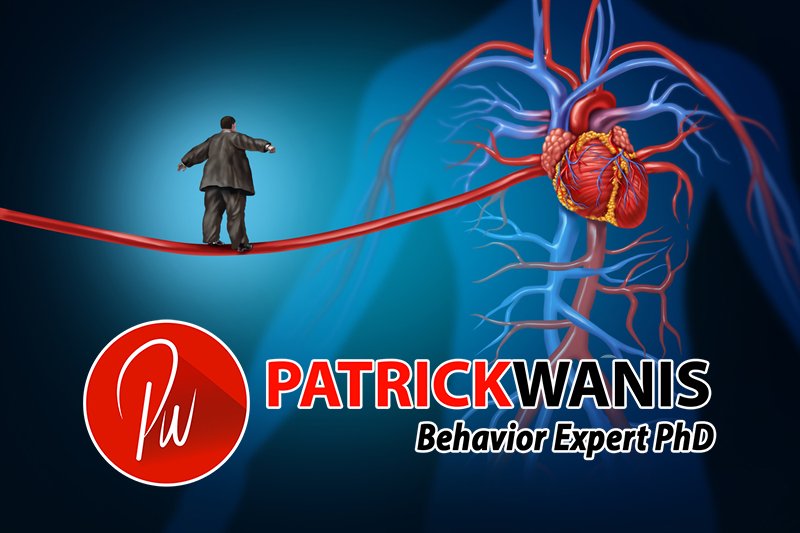
“The bottom line is the angrier we stay, the shorter we live!”
Michael Bauerschmidt, MD, MBA and Medical Director Full Potential Health Care, Fort Lauderdale, FL.
The following is a transcript of an interview between Patrick Wanis, Human Behavior and Relationship Expert, PhD and Dr. Michael Bauerschmidt, Medical Director of Full Potential Health Care https://www.fullpotentialhealthcare.com/ revealing how anger seriously impacts your body, aging you and causing death via strokes, coronary artery disease and heart attacks. Patrick Wanis and Dr. Mike also reveal quick and effective ways to deal with anger. Listen to the interview here: https://patrickwanis.com/blog/anger_ages_you_and_can_kill_you
Patrick Wanis: This is Patrick Wanis, human behavior and relationship expert, PhD.
Anger is an emotional response to feeling hurt or injured, whether it’s by an action or an event. Anger is also an emotional response to not getting what we wanted. And thirdly, anger is an emotional response to a violation or an injustice, even if the cause of that violation is done to someone else.
In many situations, anger is a normal response and emotion. But when does it become a serious concern and when does it become dangerous?
It depends on the way that we respond or react to the anger and if and when that anger begins to control us.
Interestingly, in 2000, a study was done of almost 13,000 middle-aged African-American and white men and women who were rated high in traits such as anger but had normal blood pressure. And the study found that they were more prone to coronary artery disease or heart attack. In fact, the angriest people face roughly twice the risk of coronary artery disease and almost three times the risk of heart attack compared to subjects with the lowest levels of anger. In other words, there’s a very strong correlation between anger and heart disease.
But what else does anger do to the body?
Dr. Michael Bauerschmidt is a doctor in functional medicine. He’s also the director of Full Potential Healthcare.
Dr. Mike, what effect does anger have on the body?
Dr. Mike: Well, Patrick, the anger is, of course, going to initiate the Fight-or-Flight Syndrome. And when we initiate Fight or Flight, we, of course, are taxing our adrenal glands. Our brain perceives a threat and it secretes a thing called adrenocorticotropin hormone and this stimulates the adrenal gland to put out cortisol and adrenaline.
Well, you know, everybody has heard about adrenaline or epinephrine — it raises blood pressure, increases heart rate, constricts the blood vessels and puts us on hyper alert. Our brain becomes very acutely aware of our surroundings, our vision becomes very sharp; our sense of hearing improves, and all these are designed to preserve us as a being.
However, the downside is that under this protracted stress, the stress hormones which are also our wear-and-tear hormones, they break down our tissue and they also increase oxidative stress. And if we remember from our last conversation, oxidative stress is sort of the root of all evil because it’s responsible for breaking down, as in your example with the study, the increased oxidative stress causes cracks in the linings of our arteries which is what the cholesterol sticks to, which is what predisposes us to the heart attack.
So the angrier we are and the longer we stay angry, the more oxidative stress, the more wear and tear on the arteries, the more the cholesterol deposition, the higher the risk of the heart attack.
Patrick: That was exactly what I was going to say. So anger creates the Fight-or-Flight syndrome which then creates oxidative stress because of the release of adrenaline and other chemicals and then that affects the heart and affects coronary artery disease. And is other damage done to the body as well?
Dr. Mike: Sure, just by raising the blood pressure. And even the temporary level causes wear and tear in the arteries themselves. Any time that we break down tissue, we then also then have to try to repair the tissue. And each time we repair tissue, we’re causing our chromosomes to open up and reproduce new cellular material. Well, our chromosomes don’t last forever. The more we use them, the quicker we age. And that’s the whole thing behind telomeres and the recent research on telomeres and telomerase. But that’s a little bit beyond the point of the anger. The bottom line is the angrier we stay, the shorter we live. [editor’s underlining]
For Part 2 of this transcript – the continuation, click here: https://patrickwanis.com/blog/anger-produces-adrenaline-poison/
Anointed “The Woman Expert” by WGN Chicago, Patrick Wanis PhD is a renowned Celebrity Life Coach, Human Behavior & Relationship Expert who developed SRTT therapy (Subconscious Rapid Transformation Technique) and is teaching it to other practitioners. Wanis’ clientele ranges from celebrities and CEOs to housewives and teenagers. CNN, BBC, FOX News, MSNBC & major news outlets worldwide consult Wanis for his expert insights and analysis on sexuality, human behavior and women’s issues. Wanis is the first person ever to do hypnotherapy on national TV – on the Montel Williams show.
